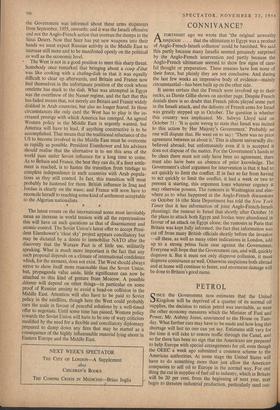CONNIVANCE?
AFORTNIGHT ago we wrote that 'the original unworthy suspicion . . . that the ultimatum to Egypt was a product of Anglo-French-Israeli collusion' could be banished. We said this partly because many Israelis seemed genuinely surprised by the Anglo-French intervention and partly because the Anglo-French ultimatum seemed to show few signs of care- ful thought or preparation. These reasons have lost none of their force, but plainly they are not conclusive. And during the last few weeks an impressive body of evidence—mainly circumstantial—has been built up on the other side.
It seems certain that the French were involved up to their necks, as Darsie Gillie shows on another page. Despite French denials there is no doubt that French pilots played some part in the Israeli attack, and the delivery of French arms for Israel was greatly stepped up in October. The question is whether this country was implicated. Mr. Selwyn Lloyd said on October 31: 'It is quite wrong to state that Israel was incited to this action by Her Majesty's Government.' Probably no one will dispute that. He went on to say : 'There was no prior agreement between us about it.' This is almost universally dis- believed abroad; but unfortunately even if it is accepted it does not dispose of the matter. For the Government's hands to be clean there must not only have been no agreement, there must also have been an absence of pribr knowledge. The Government's chief argument for intervention is that it had to act quickly to limit the conflict. If in fact so far from having to act quickly to limit the conflict, it had a week or two to prevent it starting, this argument loses whatever cogency it may otherwise possess. The rumours in Washington and else- where as to what happened at the Anglo-French discussions on October 16 (the State Department has told the New York Times that it has information of joint Anglo-French-Israeli planning); the rumour in Israel that shortly after October 16 the plans to attack both Egypt and Jordan were abandoned in favour of an attack on Egypt alone; the rumours in Paris that Britain was kept fully informed; the fact that information was cut off from many British officials shortly before the invasion —all these, as well as many other indications in London, add up to a strong prima facie case against the Government. Everyone will hope that the Government can, and will, quickly disprove it. But it must not only disprove collusion, it must disprove connivance as well. Otherwise suspicions both abroad and at home will continue to fester, and enormous damage will be done to Britain's good name.










































































 Previous page
Previous page